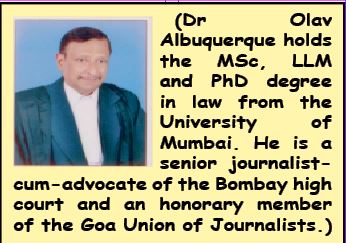Goa is abuzz with excitement as vintage bike and car owners, users, collectors and fans are decking […]

NEW LAWS: HOPE FOR HOPELESS? By Dr Olav Albuquerque
Dec 30- Jan 05 2024, LAW December 29, 2023By Dr Olav Albuquerque
GOA Chief Minister Dr Pramod Sawant’s assurance about revamping and amending the Code of Communidades needs to be applauded because there have been innumerable scams that have taken place with such land being leased to the henchmen of some ministers. However, this cannot be proved in a court of law.
The Comunidades of Goa were a form of land ownership developed pre-Portuguese times in Goa, where the original settlers held land collectively. However, ownership of land was controlled by the male descendants of those who claimed to be the founders of the Gaunkars of the village, who in turn mostly belonged to upper caste groups which were mainly the Brahmins or the Kshatriyas. The Portuguese just allowed this sort of discrimination to continue.
When the Portuguese conquered Goa in 1510, they allowed the local people to continue with their age-old customs. The Portuguese documented in 1526 these ancient form of land ownership which were similar to many other rural agricultural peoples’ forms of landholding, such as that of pre-Spanish Bolivia and the Pueblan peoples (residents of Puebla in Mexico) now in the southwestern United States, identified by Karl Marx as the dualism of rural communities: the existence of collective land ownership together with private production on the land.
DO NOT DISCRIMINATE
BUT what Chief Minister Pramod Sawant does not appreciate is that the Portuguese did a lot of good by enacting laws that did not discriminate between men and women. I am not an admirer of Portugal but as a post-doctorate research scholar in law, I have to admit that demonizing the Portuguese for colonizing Goa in 1510 is not strictly correct. This is because there will be always be pros and cons when any foreign power occupies Goan soil or any other soil in any other country’s history.
For one thing, in the overall view of Portugal, there was no discrimination between its overseas possessions in Asia, Africa or Oceania. By this logic, Portugal saw its overseas possessions not as colonies but as an extension of its national community living in Portugal. It saw its so-called colonies as one single national community covering a territory that was one jurisdiction despite geographic discontinuities.
This is why it is the Portuguese who codified (recorded in writing) the ancient Gaunkari system of village communities, wherein the upper castes were the original settlers and decided to punish criminals following their criminal jurisprudence. Territorially, Portugal was a unitary state divided into overseas provinces that oversaw greater administrative decentralization than in their mother country of Portugal.
Hence, these overseas provinces were given absolute autonomy so that particular jurisprudence statutes of the native population were permitted, with the result that Goa, Daman and Diu which were geographical, not contiguous territories, were allowed to administer themselves and even legislate without referring their laws back to Portugal for approval.
POSITIVE OUTCOME
A POSITIVE outcome of this was the Portuguese enacted a Uniform Civil Code which did away with discrimination between men and women at least 100 years before the Constitution of India came into existence. When Article 14 was never envisaged, the Portuguese ensured that discrimination between men and women which was woven into the Muslim and Hindu personal laws did not hold sway.
Hence, a married woman was still entitled to her share of her father’s estate unless she chose to voluntarily renounce it in front of two witnesses who were not related to her. This renounced had to be registered before an authority so that there was irrevocable evidence of such renouncement.
A Muslim man was not allowed to keep four wives or divorce any of them by following the talaq-i-bidat or triple talaq which entitled him to pronounce talaq three times in succession to throw her out of his hearth and home. Irrespective of religion, each resident of what was then known as Goa had to adhere to the principle that one man should have one wife. And no concessions were made.
Religion is based upon faith which is a synonym for irrationality. Nearly all religions be they Abrahamic such as Judaism, Christianity, or Islamic, or Eastern religions such as Hinduism, Buddhism or Jainism, discriminate against women in a subtle form. On April 11, 1933 it was the university professors who drew up the Portuguese Constitution which took into consideration the long period that the Constitutional Charter of Monarchy was in force between 1826 to 1910.
The Portuguese Constitution was revised in 1945 and 1951. This Constitution had 181 articles divided first, into fundamental guarantees to all Portugal citizens and second into the political organization of the state. These revisions ensured non-discrimination between men and women and overseas citizens such as Goans who were entitled to migrate to Portugal where they were ensured the same rights as those who lived in Portugal.
SLEW OF NEW LAWS
WITH the new year 2024 we will see a slew of new laws replace the old colonial laws of the Indian Evidence Act of 1872, the Criminal Procedure Code of 1973 and the Indian Penal Code of 1860. The Modi government promises that criminal cases will be disposed of within an outer limit of three years.
We hope the government will live up to this promise.
















